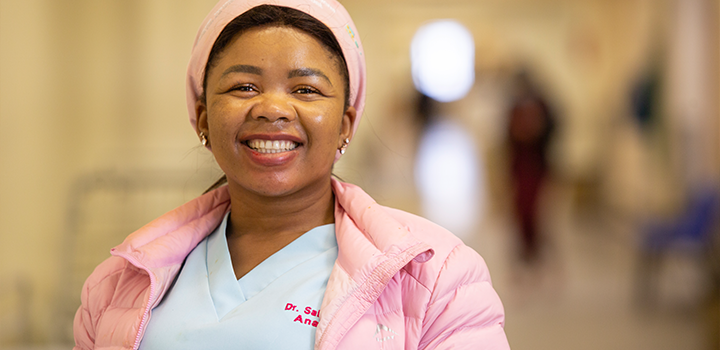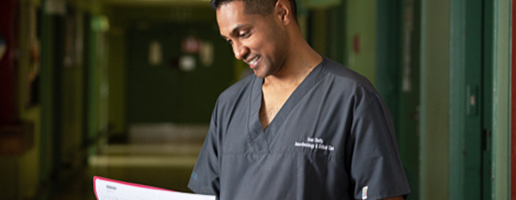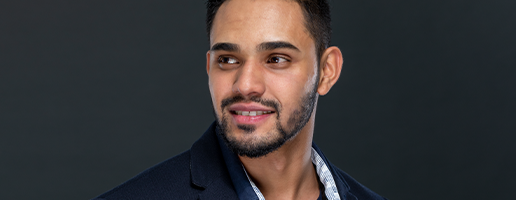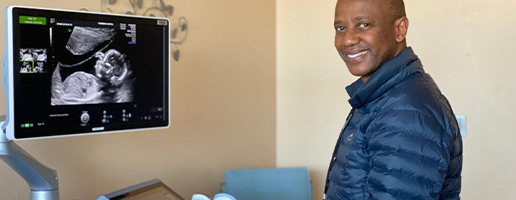Dr Ncumisa Sabona wants to upskill junior doctors in anaesthesiology in Mthatha

Dr Sabona is researching the prevalence and risk factors of imaging confirmed neurological complications among patients with hypertensive disorders in pregnancy.
Joking with her fellow medical students about mistakes they made during earnest case presentations and comparing faux pas of their first year in anaesthesiology training are among the fond memories of Mthatha-based registrar and Discovery Foundation Award recipient, Dr Ncumisa Sabona.
"We took ourselves so seriously and tried so hard not to make mistakes, but inevitably we did," she laughs.
Too many pregnant women are dying in Mthatha
As her knowledge and skills increased, she learned how to detect the early warning signs of potentially fatal maladies in patients, turning one especially challenging set into the research topic she's now engrossed in. Her Discovery Foundation Rural Individual Award will help her research the prevalence and risk factors of imaging-confirmed neurological complications among patients with hypertensive disorders in pregnancy.
It's an unquantified phenomenon in Mthatha where she's doing her second year of anaesthetics registration, but the precipitating hypertensive disorder prevalence is at least a third higher than the published 10% in pregnant African women, she believes. "The neuro complications I'm researching are definitely not higher in Mthatha than the African average, but I'd say hypertension among our pregnant women runs as high as 15% to 20%. Just too many women die of both," she says.
Call for more awareness and better education
Dr Sabona wants more awareness campaigns around early hypertension clues like persistently high blood pressure, headaches, dizziness or loss of vision, and better education among primary healthcare workers to enable appropriate referral. "Neurological complications are devastating. Things like severe headaches could indicate pre-eclampsia which if treated early can be avoided," she adds.
Fatalities in rural settings were generally higher because too many pregnant women failed to attend ante-natal clinics, and when they did, the high patient loads often resulted in sub-standard care.
Born to Nkosiphendule Sabona and Vuyiswa Yose, Dr Sabona is the eldest of four siblings, one of them also a doctor, and four step-siblings.
After medical school, she did her internship at Helen Joseph Hospital in Johannesburg and her community service at Cecilia Makiwane Tertiary Hospital in East London. She spent some medical officer time at the Qumbu Health Clinic and Nelson Mandela Academic Hospital in Mthatha where she began her anaesthetics training.
At the time of writing, she was due to complete a rotation at Tygerberg Hospital in December before returning to her home hospital in Mthatha and being reunited with her mother and sister who were looking after her two young daughters.
Lack of specialists in Mthatha
Dr Sabona is hoping that her Discovery Foundation grant will free her up from being on call all the time and give her more time with her daughters. She says at present there are only five anaesthesiologists at Nelson Mandela Academic Hospital which serves the sprawling former Transkei homeland.
"We easily need double this to even begin meeting the demand. So, I plan to add value when I get my MMed and teach juniors who want to get into this speciality," she enthuses.
Why does Dr Sabona love anaesthesia? "It encompasses everything you've learnt and you get to work with everyone in terms of patient profiles. Wherever they are, they eventually come to theatre and meet you," she says.
The best aspects of her job include seeing patients getting better and returning home without having to undergo an operation, and those successfully operated on being discharged, fully restored to health.
"It's very satisfying to see, because you know many would never have made it otherwise," she says.
The worst part of her job? "The long hours. It can be very strenuous, especially when you're on call. It can get hectic. My longest shift ever was 24 hours as an intern. The sun comes up and you realise you're still working until noon," she recalls.
Asked how she copes as an overloaded registrar, Dr Sabona says she is supported by a nanny for her daughters. "But I would have had great difficulty managing without my mother and sister who live close by."
About the Discovery Foundation
Since 2006, the Discovery Foundation has invested over R256 million in grants to support academic medicine through research, development and training medical specialists in South Africa.
The Discovery Foundation is an independent trust with a clear focus - to strengthen the healthcare system - by making sure that more people have access to specialised healthcare services. Each year, the Discovery Foundation gives five different awards to outstanding individual and institutional awardees in the public healthcare sector.
Related articles

Dr Chetty embraces the chance to ease SA's pain burden
Since arriving in Boston on June 2019 to study pain management, anaesthesiologist Dr Sean Chetty is slowly settling into the new way of life - and is excited about what his Discovery Fellowship-funded year has in store.

Making a heartfelt difference in patients with high blood pressure
Armed with a Discovery Foundation Rural Individual Fellowship Award, Dr Trenton Oliver is determined to raise awareness on hypertension, or high blood pressure, and to educate patients in KwaZulu-Natal on how and when to take their medicine.

High-risk pregnancies in rural Mpumalanga: a dedicated doctor to the rescue
Having a high-risk pregnancy if you live far away from an urban centre is a terrifying experience. Many women in Mpumalanga are thankful that Dr Sibusiso Nhlapo, obstetrician and gynaecologist, didn't listen when his parents suggested he become a teacher.